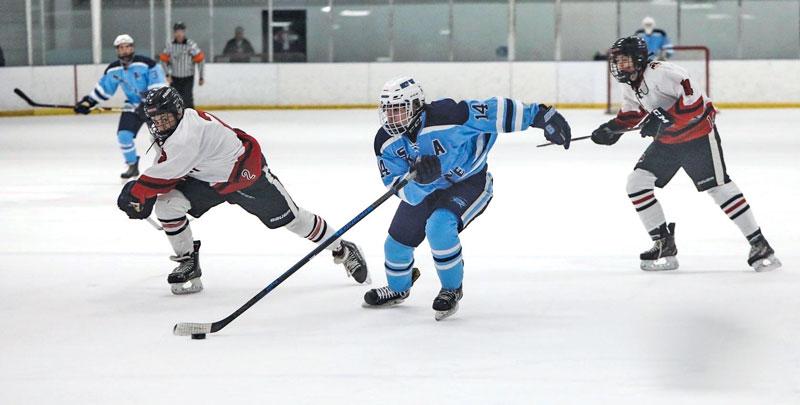O’Brien attends Community High School and plays sports for Skyline. He had just finished an outstanding hockey season and baseball tryouts when the Covid-19 pandemic abruptly ended his senior year. “I had a terrific three-and-a-half years in high school, and then it came to a crashing, premature halt,” he says.
Classes didn’t end when school closed. In May, O’Brien still had to complete eighteen required assignments, graded pass/fail, to earn his diploma. But “it’s difficult to get fired-up about advanced calc now,” he says. “I worked hard for grades in high school, but I have zero motivation to get up in the morning. I’m looking for a reason to get schoolwork done. Sports, friends, graduation … they’re all gone.”
And what comes next is up in the air. He is on the wait list for the U.S. Naval Academy, but he also has a full four-year ROTC scholarship to the University of Southern California–which may, or may not, be in session in the fall. His required ROTC boot camp this summer has already been canceled.
To fill his time, he plays video games into the night, sleeps until early afternoon, and works out a lot–with his younger sister rather than his friends. Once or twice a week, he and his friends arrange “car hangouts.” They choose a parking lot, form a circle with their cars, and sit on the hoods to talk.
His father is telecommuting from home, and his mother is working hard to bolster the spirits of her four children. One day, she pulled out ancient videotapes, and the family watched scenes of his two sisters coming home for the first time. “That was cool,” O’Brien admits. “And Mom’s baking a lot of cookies–I appreciate that.”
Skyline senior Elena Garcia-Schroeder says she was “pretty devastated” when in-school classes were canceled–“not just for myself but for the groups and activities I’m involved in and for the lost moments with my friends.”
She was scheduled to sing a solo for the award-winning Skyline Blues’ a cappella concert and had been chosen for the lead role in The Little Mermaid. She had bought her dress for prom and looked forward to graduation in June.
The pandemic canceled them all. At first, she says, she was “too caught up in my own feelings of loss. But Zoom calls, some socially distanced walks with friends, and online resources have helped.”
She and her closest friends were resourceful, too. On prom night, they slipped into their prom dresses, applied makeup and nail polish, just as if they were going to prom, and drove to the Skyline parking lot, where they met, careful to keep appropriate social distancing. She’s continuing to work on her music at home with the Skyline Blues directors, and Skyline is considering some kind of graduation event, possibly in late summer.
But her summer job as a counselor at Camp Al-Gon-Quian remains in jeopardy, as do her freshman orientation session and first semester at Northwestern University. “The Northwestern president says he’s optimistic that classes will resume on campus in the fall, but this is definitely another challenge to overcome,” she says. “Many of my friends are thinking of postponing college enrollment and taking online community college classes to save money and stay safe.”
Angelo Quail is at the far end of that academic trajectory: he was enrolled in a postgraduate music fellowship program in Florida when everything shut down. A gifted clarinetist, he has been counting on the program as a springboard to a coveted seat in a nationally renowned orchestra–typically U.S. orchestras hire only five or six new clarinetists each year.
Instead, he drove home six weeks early to quarantine with his parents–and to worry about his career prospects. “Finding work in classical orchestras is predicated on having audiences–and our audiences are generally older, in the population that is most susceptible to the virus,” he says. “Most orchestras are very fragile organizations that rely on individual donations … I’m worried some orchestras will fold, and others, if they manage to survive the economic impact, may be forced to change the way they compensate professional musicians in the future.”
Lauren Penrose saw the “most important part” of her last her semester disappear overnight: her figure-skating team’s performances, nationals, and ice show. National Honor Society awards night. Prom. Graduation. And hard-won second-semester A’s will become “Pass.” (“I did all the extra work for nothing!”) She’ll have to take AP tests at home, open book. And U-M orientation will be virtual.
“Actually, I think my sister, who is a junior, is as affected as I am,” Penrose says. “She was supposed to take SATs this summer, but they were canceled. The next ones are in November, after most college applications are due. Sarah is a softball player who wants to play Division I, and she’s concerned she won’t be recruited because no one will see her play.”
Garcia-Schroeder is struggling to keep missing high school traditions in perspective. “Absolutely nothing is like I expected my world to be right now. I can’t say I don’t have days when I’m sad and angry,” she admits. But she understands that everyone’s safety and health are the most important considerations right now.
“Our graduation is taking place in the Year of the Coronavirus. We’ll certainly all have a story to tell in the years to come.”


